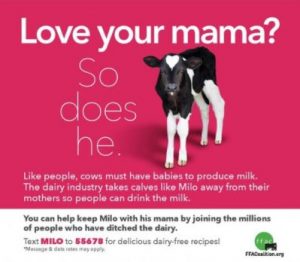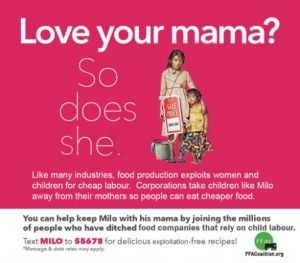
The above ad in its original form is taken from the Factory Farm Awareness Coalition which promotes a commitment to “empowering people to save the environment, animals, and our own health through our daily food choices” (“Factory Farming Awareness”). This specific advertisement is trying to sell a dairy-free diet as an ethical lifestyle choice, and attempts to evoke sympathy in the viewer which will inspire them to change their consumption patterns. The image of the young calf accompanied by the caption “Love your mama? So does he,” aspires to humanize the animal to the extent that the audience will question the impact their diet has on other living things, the environment, and the world.
While I don’t necessarily have any beef with the advertisement itself (pun intended!), I do sometimes take issue with vegetarian and vegan marketing. In choosing not to eat animal by-products myself, I am exposed to the culture and community of vegetarianism and veganism more often than an outsider might be, and see a lot of marketing which advertises the lifestyle in a trendy, almost higher-than-thou way. Companies like Whole Foods, Trader Joes, and other health-food focused food suppliers push a model of ‘ethics of consumption’ and cultural capitalism that Slavoj Zizek discusses in his lecture, where consumers feel as though they are transcending consumerism by contributing to the well-being of something bigger than themselves, and fulfilling a duty to society. What I find somewhat hypocritical is that these marketing campaigns will advertise a cruelty-free lifestyle, when in fact a lot of the time they neglect the human justice aspect of the food industry and even depend on the exploitation of black and brown bodies in its production. They start to “compartmentalise ethical issues” and “forget that abstaining from one moral wrong doesn’t eradicate all others” (McCormack).

What I decided to do to address the erasure of human justice in marketing for animal-rights activism, veganism, and vegetarianism was switch the image of the calf to an image of human children, taken from a World Vision campaign against child trafficking and exploitation (http://nochildforsale.ca/). I thought that this would evoke similar sympathy, due to the increased sensitivity people feel towards babies, whether they be humans or animals. Furthermore, I changed the text to bring attention to the exploitation of people, specifically women, children, and people of colour, in the production of food, but did my best to maintain the message of the original advertisement. I wanted to highlight how widespread and still relevant human trafficking and exploitation is; according to Dr. Frances McCormack, about “sixty percent of child labour worldwide takes place in the agriculture sector,” not to mention that much of the chocolate industry is run on the exploitation of children for labour as well.
Especially in terms of diet, people simply cannot claim to live a cruelty-free lifestyle if they restrict dairy intake but do not check the impact of the production of their meals on humans, too. Sure, it might be an “innocent shorthand for ‘no nonhuman animals were exploited to make this,’” but McCormack further argues that it can “appear as a complete disregard for the fact that many of the foods that we commonly consume are products of forced labour, human trafficking, exploitation and suffering.” In other words, if your food depends on racism and exploitation, it is not cruelty free.
However, I also think that my edit necessitates a critique. It also plays into the culture of consumption in that by eating “fair trade,” for example, you’re fulfilling your ethical duty to society. It encourages us to do the bare minimum and find band-aid solutions rather than work to break down the systems of oppression which allow child labour and human exploitation to occur in the first place- systems such as racism, capitalism, neoliberalism, and colonialism. Secondly, the image relies on the notion that black and brown bodies need to be ‘saved’ by white folks, recreating the false dynamic of sufferer/saviour between western society and the so-called ‘third-world’. Thus, while I believe my edit addresses the issue of the original advertisement, it comes with problems of its own, which I thought were important to acknowledge as well.
Sources
“Factory Farming Awareness Coalition.”Factory Farming Awareness Coalition, www.ffacoalition.org/.
McCormack, Frances. “Stop Calling Vegan Food ‘Cruelty-Free.’” Ecorazzi, 20 Jan. 2016, www.ecorazzi.com/2016/07/20/stop-calling-vegan-food-cruelty-free/.
Zizek, Slavoj, director. Ethics of Consumption – Cultural Capitalism. Ethics of Consumption – Cultural Capitalism, Rowansforclass, 20 Nov. 2011, www.youtube.com/watch?v=GRvRm19UKdA.